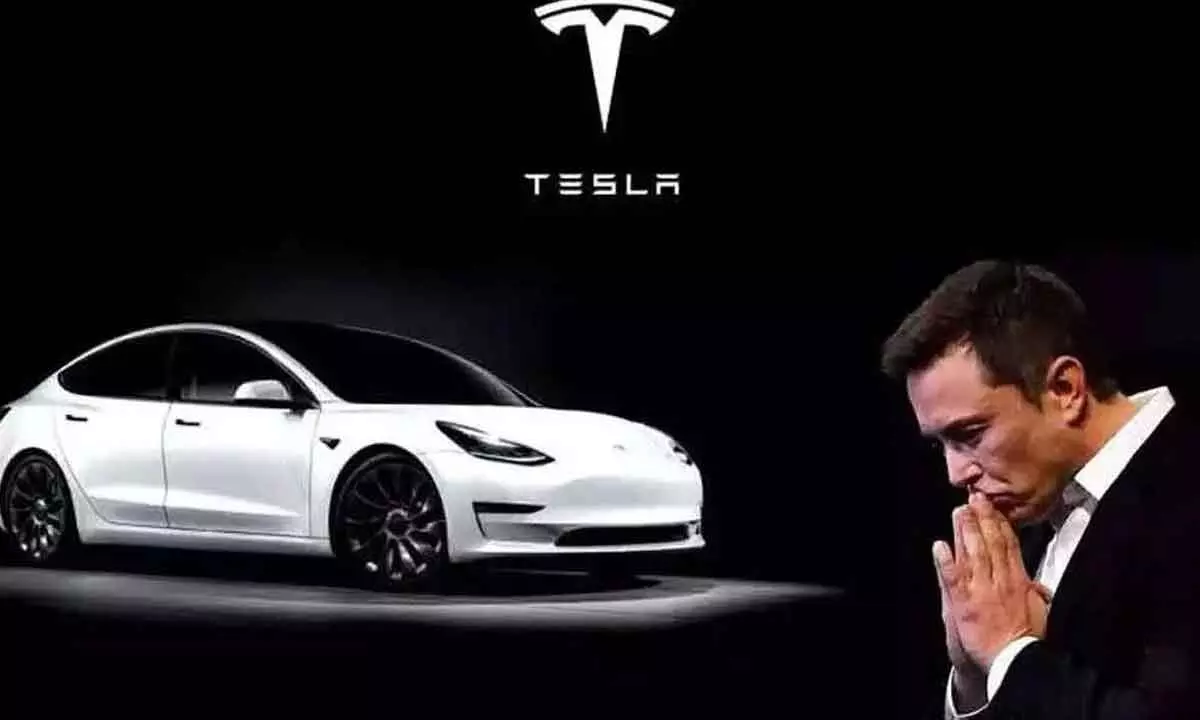Indian auto market tough to penetrate even for proven propagandist Elon Musk
Noted British investor Jeremy Grantham recently said Tesla founder Elon Musk used propaganda as a powerful tool to make loads of wealth out of thin air!
image for illustrative purpose

Tesla is currently developing an electric car which will be priced below $25,000. The electric carmaker may launch this model in India. As import duties are high and the Indian government is unlikely to give any relief to Tesla on duties, even the lowest-priced Tesla electric car will cost a bomb in India. If Musk wants to tap the Indian automotive market successfully, he should set up a manufacturing unit to cut costs and make Tesla cars affordable for Indian buyers. Otherwise, like many auto giants in the past, it will fail in India
Noted British investor Jeremy Grantham recently opined that Tesla founder Elon Musk used propaganda as a powerful tool to make loads of wealth out of thin air! This startling revelation has come from the seasoned stock market investor, who made a name for himself after predicting the 2002 dotcom crash and the 2008 global financial meltdown.
In a recent podcast, Grantham, co-founder of investment management company GMO, said that he wrote in 2019 that it looked uncertain that Tesla would survive two years as it did not have any earnings and at that time it didn’t look like the electric carmaker might have earnings in the first place. But, according to the legendary investor, Musk used propaganda to fuel a rally in his stock and then sold lots of stock to fund mega factories. Grantham described Musk’s propaganda tactic as a miraculous management strategy that generated money ‘out of thin air, out of bull**** and charisma’. Tesla’s shares jumped 10-fold since 2019!
I wrote about Musk on similar lines in an earlier BizyLife column when the Tesla founder emerged as the world’s wealthiest person and Tesla enjoyed a humongous market capitalisation of $600 billion. At that time, Tesla’s total annual sales stood at a tad over 500,000 units while its total revenues were $31.5 billion.
In the year 2022, Toyota Motor Corporation, the world's largest automaker with Japanese roots, sold 9.53 million vehicles globally and generated total sales revenues of $256.7 billion. Toyota was nearly 20 times bigger than Tesla in terms of units sold and eight times bigger than the electric carmaker when it came to annual revenues. But Toyota’s market capitalization on the New York Stock Exchange (NYSE) was just $293 billion, a lot lower than half of Tesla's! It is still at $308 billion only while that of Tesla Inc zoomed to $767.32 billion as on Sunday (September 24).
So what else has driven Tesla Inc share prices and market capitalization to stratospheric levels other than Musk’s propaganda?
He is also trying to do the same with Twitter, which he rechristened as X recently. It is no wonder that Musk is the world’s richest person even today with a total fortune of $228 billion. His fortune went up by a whopping $91.2 billion this year, which still has three months to go. Musk’s success demonstrates the power of propaganda if channelled appropriately.
Nevertheless, there has been talk for quite some time that Elon Musk will bring Tesla to India. He met Prime Minister Narendra Modi during the latter’s visit to the US in June. The latest developments indicate that Tesla is developing a supply chain in India. It has already sourced $ one billion worth of components and manufacturing inputs from India in 2022, which it will increase to $1.9 billion this year.
There is no denying that developing a supply chain ecosystem is essential if Tesla wants to set up an electric vehicle factory in India. There are also reports that it will set up a battery storage manufacturing unit here. Tesla is currently developing an electric car that will be priced below $25,000. The electric carmaker is reportedly contemplating launching this model in India.
But the Indian automotive market is a tough nut to crack even for a seasoned propagandist like Elon Musk. As import duties are high and the Indian government is unlikely to give any relief on duties, even the lowest-priced Tesla electric car will cost a bomb here. If Musk wants to tap the Indian automotive market successfully, he should set up a manufacturing unit to cut costs and make Tesla cars affordable for the domestic buyers. Otherwise, like many auto giants in the past, Tesla will come a cropper in India.
For that matter, General Motors and Ford, both American auto giants, failed miserably in India and pulled out from the market with financial bruises and what not. Japan’s Toyota Motor Corporation, the world’s largest automaker, still remains on fringes. The list of losers on India’s automotive landscape doesn’t end just there. French carmaker Renault and Nissan, another Japan automaker, also burnt their fingers. Barring Maruti Suzuki, the Indian arm of Japan’s Suzuki Motors, and South Korea’s Hyundai Motors, no other carmakers tasted success in India. It’s better if Tesla finds out the reasons behind the success of these top two automakers before going ahead with its grand India plans.
Musk’s task is cut out. Will he rewrite history by altering the script and emerge winner in the highly-competitive Indian automotive market? Only time will tell.

